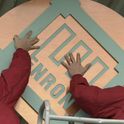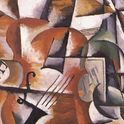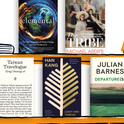Politics Rachel Sylvester
The New Few: Or a Very British Oligarchy by Ferdinand Mount (Simon & Schuster, £18.99)
This is supposed to be the age of individual autonomy and mass democracy, an era when the internet has distributed power more widely than ever, with diplomacy conducted via Twitter and celebrities created overnight on TV. But Ferdinand Mount’s theory is that Britain is in fact in the hold of an oligarchy which is concentrating influence and wealth to an unprecedented and dangerous extent in the hands of the few, not the many.
Weaving politics and big business, bankers’ bonuses and media moguls, the European Union and the centralised state, the Occupy movement and last summer’s riots, he argues that the country is seeing the rise of a super-rich and super-powerful elite that is becoming increasingly detached from the rest of society, with devastating consequences. George Osborne’s declaration that “we are all in this together” sounds “grotesquely implausible” in a way it would not have done a generation ago, because not only has inequality grown so rapidly but also “power seems to have been tightly gathered in the hands of a small number of dominant characters.” This is a critique of modern capitalism and social breakdown that is written from the right rather than the left. Coming from the former head of Margaret Thatcher’s policy unit, who is also a cousin of David Cameron, it is a fascinating thesis.
Rachel Sylvester is a political columnistPsychology John Gray
Missing Out: In Praise of the Unlived Life by Adam Phillips (Hamish Hamilton, £20)
“For modern people, stalked by their choices, the good life is a life lived to the full.” In this striking image, the psychotherapist and writer Adam Phillips presents the central theme of his latest and possibly most subversive book: the idea that modern people cannot help living a double life in which what they experience is shadowed by imagined experiences they feel they are missing. The modern project, Phillips writes, is “to create societies in which people can realise their potential.” We like to think each person is a reservoir of untapped talents and ambitions, practically infinite in their variety and scope. But infinite possibilities cannot be realised in lives that are finite, and the result is that modern lives are defined by loss—the loss of lives that were not lived and never could have been.
Exploring this sobering and yet in some way liberating thought, Phillips shows how the modern double life features in literature—Shakespeare’s tragedies, Larkin’s poetry and Graham Greene’s stories, for example—and in the theory and practice of psychoanalysis. Though much of Phillips’s subtle and powerful book is demystifying in effect, the result is the reverse of dispiriting: by accepting that our lives will be largely unlived, he suggests, we can learn to live more fully the life that we actually have.
John Gray is a writer and philosopherChina Rana Mitter
Tiger Head, Snake Tails: China Today, How It Got There, and Where It Is Going by Jonathan Fenby (Simon & Schuster, £20)
This autumn, China will undergo a once-in-a-decade leadership change in the shadow of one of the most bizarre political scandals in the country’s recent history: the downfall of Chongqing party chief Bo Xilai. As the new leaders take office, they will also be aware that the country’s economy has slowed down significantly for the first time in some two decades. China lends itself to apocalyptic narratives, so a well-informed overview of the economic, social and political forces that hold China together is essential for developing a more nuanced view. Jonathan Fenby’s Tiger Head, Snake Tails admirably fulfils that role.
Fenby knows Asia well, having been editor of the South China Morning Post at the time of the 1997 Hong Kong handover, and the book benefits from his journalist’s eye, with snapshots of everything from the growing prevalence of depression among China’s elderly population, to the current price of an empty bottle of Chateau Lafite for refilling by counterfeiters (2900 yuan, nearly £300). But the book also has a strong sense of history. Rather than just relying on very contemporary statistics to shock and awe, Fenby reminds readers of the tortuous path that China has taken to its current prosperity, repeatedly suffering invasion and occupation at the hands of foreign imperialists as well as its own regimes. Fenby never ignores the dark side of China, whether it’s the fate of migrant workers or intellectual dissidents, but his account gives the light and shade necessary to understand this increasingly important power.
Rana Mitter is a broadcaster and Professor of the History and Politics of Modern China at Oxford UniversityMemoir Jane Shilling
The Man Within My Head: Graham Greene, My Father and Me by Pico Iyer (Bloomsbury, £16.99)
Many writers would admit (perhaps reluctantly) to having a literary “godparent”—someone whose influence has shaped their work. In his memoir, or “counterbiography,” the travel writer Pico Iyer explores two very different paternal influences: his real father, the scholar Raghavan N Iyer, and his “unofficial alter ego,” the novelist Graham Greene.
Greene, Iyer observes, “was never a writer I dreamed of becoming.” The two men never met (though they corresponded, briefly). Yet Greene’s own writing is full of encounters that seem almost predestined, and there is a fateful quality to his presence in Iyer’s life. Like Greene, Iyer distrusts memoir: “It was too easy to use recollection as a way to forgive yourself for everything.” Instead he explores obliquely a life lived through a series of absences, departures, brief encounters—always with the troubled shade of the novelist as his companion.
In the end, it is not Greene the “patron saint of the foreigner alone” who touches Iyer most deeply, but the Greene who yearned for the things in which he claimed no longer to believe: innocence, peace, permanence.
“In every book, there is another text, written in invisible ink between the lines, that may be telling the real story, of what the words evade,” Iyer writes. In this elegantly elusive memoir, the text between the lines dares to explore the terrible simplicities of faith, love, compassion, trust, that Greene’s flawed characters constantly seek—and sometimes even find.
Jane Shilling’s latest book is “The Stranger in the Mirror” Fiction Amanda Craig
The Song of Achilles by Madeline Miller (Bloomsbury, £7.99)
While modern Greeks are experiencing their own tragedy, ancient Greece has rarely been more fashionable. Following the success of films from 300 to The Hunger Games (inspired by the myth of Theseus), Madeline Miller’s novel The Song of Achilles won this year’s Orange Prize. Based on the Iliad, it’s narrated by Patroclus, Achilles’s friend, who accompanies him to Troy and dons the hero’s armour to rally the Greek army when Achilles is sulking in his tent.
Like Mary Renault before her, Miller has imagined the people behind the myth. Where the Iliad shows the glory of war as well as its horror, our narrator sees the damage, arrogance and mess. Effectively a modern sensibility in an ancient culture, he gives voice to the disquiet contemporary readers feel about glorifying violence.
The best parts of the novel come in the first half, a prequel to the Iliad, as it sketches Patroclus’s banishment from home and his joy in becoming Achilles’s friend. Their education by a Centaur and Achilles’s chillingly ambitious sea goddess mother Thetis are faithful to myth and fill out the gaps in vivid detail, but may err too close to fantasy territory for some, and the lyrical descriptions of Achilles’s beauty lack the restraint of Renault. That said, this was a novel that kept three generations of my family absorbed during a recent holiday, provoked many lively discussions and returned us all to Homer.
Amanda Craig is a novelist and critic
Economics John Plender
Red Capitalism: The Fragile Financial Foundation of China’s Extraordinary Rise by Carl E Walter & Fraser JT Howie (John Wiley & Sons, £19.99)
Having generated the fastest industrialisation in history, China must rank among the greatest economic stories of all time. It has survived the financial crisis in great shape, after engineering a huge fiscal stimulus. And as western visitors know to their cost, any dialogue with Chinese officials is prone to be accompanied by triumphalist references to the bankruptcy of neo-liberalism and the ineffectual nature of democracy. Yet the Chinese economic model, which entails an incredible rate of fixed capital investment running at around 50 per cent of gross domestic product, is flawed. The post-crisis stimulus package involved a huge misallocation of capital and put an end to ten years of microeconomic reform. The authors of Red Capitalism, longstanding experts on Chinese finance, argue that there are two Chinese economies: one consisting of family-owned and foreign companies that generate most of the growth in a buccaneering free market environment, the other dominated by slow-growth, debt-financed state enterprise. The state sector is run for the benefit of party officials and their families and thus represents a formidable obstacle to economic reform. The book puts a powerful case that the unreformed Chinese model is ill-equipped to support the country’s superpower aspirations and urge for reserve currency status for the renminbi. It could usefully be read in conjunction with Richard McGregor’s superb political exploration The Party: The Secret World of China’s Communist Rulers. John Plender is a columnist for the Financial Times Biography Dominic Sandbrook Muckraker: The Scandalous Life and Times of WT Stead, Britain’s First Investigative Journalist by W Sydney Robinson (Robson Press, £20) In an age when the excesses of the newspapers are on everybody’s lips, this book could hardly be better timed. Extensively researched and briskly written, with a lovely eye for detail, a wry sense of irony and a fine grasp of character, it brings alive an age in which sensationalist papers went further in search of a story than even Rebekah Brooks would think appropriate. The most influential journalist of the Victorian age, a man of boundless energy and conviction, WT Stead broke almost every rule imaginable. An inveterate flirt who was often caught kissing visitors in the editor’s office, he spent decades campaigning against sexual immorality. He twisted the truth, invented quotations and doctored pictures. He tried to get the Pope to relocate to London, campaigned for the Boers against the British and even claimed to be in touch with Winston Churchill’s dead father. Like many modern editors, Stead saw himself as the voice of the people: his job, he claimed, was to “interpret the aspirations of the lower, inarticulate classes to those in power.” Most infamously, Stead bought a teenage girl, Eliza Armstrong, from her parents and installed her in a brothel—all, he said, in the name of the greater good, to expose the horror of “white slavery.” His peers were outraged; sales of his Pall Mall Gazette, however, went through the roof. By comparison, today’s journalists look positively saintly. Dominic Sandbrook’s latest book is “Seasons in the Sun: The Battle for Britain, 1974-79” Science Oliver Morton Science in the 20th Century and Beyond by Jon Agar (Polity, £30) The new book from University of London professor Jon Agar may come as something of a shock to readers. While popular histories of science generally use the past to help explain the present and celebrate the achievements of great men, this is history of science as it is practised by academic historians. Agar does not seek to explain what science says about the world—if you don’t know what relativity means, or how transistors work, this book won’t tell you. Instead it’s a way of learning how it comes to say it, and why it bothers. In particular, Agar is keen to show how scientific problems emerge (often because of warfare, whether it be the fixing of nitrogen necessary for making explosives or the psychiatric assessments necessary for training soldiers). This approach focuses on the relationship of science to external ideas and practices, thus tying it more tightly to broader histories; it also emphasises patterns of discovery over the individual flashes of insight. Both are useful correctives, and scientists, historians and those who aspire to be either will all benefit from them. Oliver Morton is a science writer and editor











